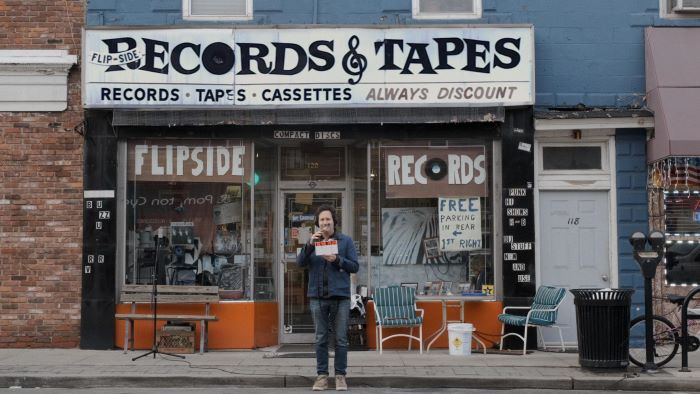You might know director Chris Wilcha from his 2000 documentary The Target Shoots First. In it, Wilcha, then a recent college graduate and an all but card-carrying member of Gen X, documented his experience working as a production manager for a large corporation as he fights to keep his integrity. After he quit, he cut roughly 200 hours of footage into a 110-minute film. To his surprise, the result became something of a hit, receiving positive reviews for its sense of humor and its stick-it-to-the-man sensibility. Opportunities opened up for Wilcha, and after connecting with Judd Apatow, he ended up moving his family to Los Angeles.
You also might not know director Chris Wilcha because, since the move to LA, he has mostly directed commercials. There are a few TV specials and documentaries to his name, and he did direct the first and only TV season of This American Life, which he describes as the last time he truly felt like he had a purpose. Otherwise, his filmography is a long list of projects half made: a documentary on the White Stripes, another on jazz photographer Herman Leonard, yet another on writer Starlee Kline as she struggled with a creative slump. These are just three entries on a much longer list of hard drives stacked on Wilcha’s shelf.
There’s also one on Flipside Records & Tapes, a store in New Jersey where Wilcha worked as a teenager. Wilcha remembers the place as a kind of heaven for weirdos and music nerds of his generation, yet at the time of his return decades later, the store has fallen on hard times. Flipside, the movie he’s finally finished, is both about this store and his attempt to make sense of a life that he has not, thus far, spent the way he intended.
The film consists of footage of the store, from Wilcha’s unfinished films, visits to his family home, and his reflections on his ambitions and the passage of time, among other things. Considering its 96-minute running time, there’s a lot of material and talking heads. Many of the subjects are those whose lives have not turned out quite the way they wanted (Uncle Floyd, a local TV show personality), yet there are others, such as Wilcha’s parents, who provide a humorous perspective—neither of them has regrets of lives unlived. There is plenty of discussion regarding the compromises different people (successful artists and otherwise) have made in life, how one’s best laid plans have fallen by the wayside, and how to reconcile between wanting to hold onto things from one’s past and failing to let go.
As a result, the film traffics in some pretty predictable life lessons. Guess what, everyone: We all need to move on. Though the tone is frequently outright sentimental, it’s often charming nonetheless and strongest when individual personalities come into focus. There is much pleasure to be had from hearing of the different ways people have responded to the changing world—the most poignant ones are from outside of the celebrity circuit.
There are, however, times that Flipside comes dangerously close to a tour of Wilcha’s favorite friends. Indeed, this film loses focus when it swerves too much into stories about his projects and relationships with them, though there is a point in many of these detours. Wilcha often uses them to further open up his discussion of the compromises many have made. Writer/producer David Milch, for instance, barely saw his family and made many promises he could not keep. Still, these sections hover at the brink of sycophancy. When Wilcha counts Judd Apatow, David Milch, and Ira Glass as friends and acquaintances, it’s hard to feel too much sympathy for the films unmade.
Like many people in middle age, Wilcha is confronting a world he no longer recognizes, and his dedication to never selling out is both a thing of the past and a commitment he failed to make. He concludes, or seems to, that this is something he can simply let go, so long as he can memorialize it. Yet compromises of adulthood set aside, in this highly corporate, increasingly homogenized world, might we not be missing this type of defiance? Perhaps not all things need to be let go.







Alternative perspective (against the grain of automatically raving reviews by insiders): this self-indulgent diary, from a luxury commercial ad spot videographer who wants to be a filmmaker, is the very definition of privilege. Only the media establishment (and pertaining wannabes/barnacles) are themselves desperate enough to cheer him on; normies in any general audience will spend the whole running time rolling their eyes at this rich family guy’s suburban midlife crisis. But hey, he’s got friends in high places, if you want to know how this diary video got so much money and attention thrown at it…